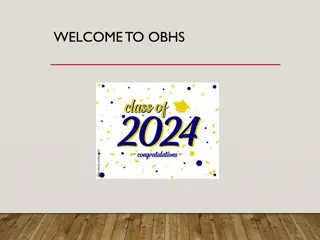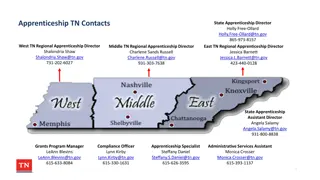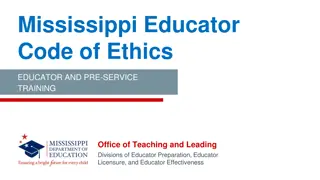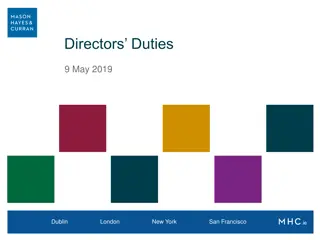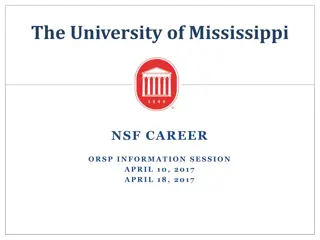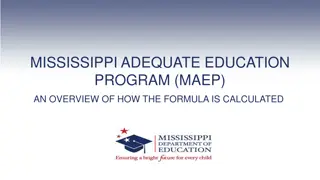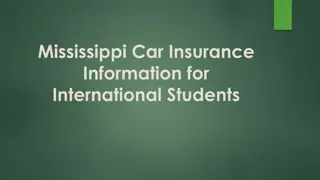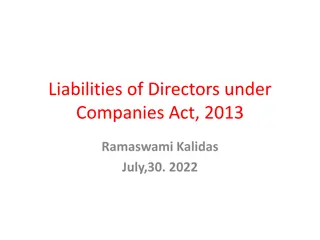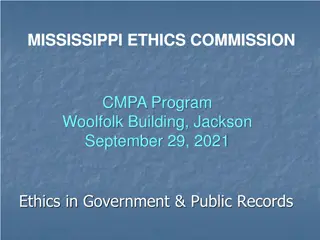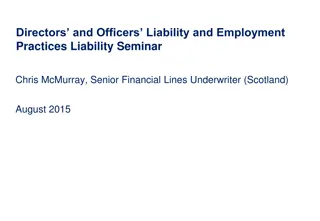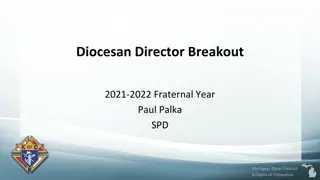Special Education Law Update: Key Takeaways from Mississippi Directors Conference
The presentation at the Mississippi Directors Conference in June 2016 highlighted important updates in special education law, including the impact of the Every Student Succeeds Act, changes in teacher qualifications, requirements for special education teachers, accommodations, assessment accommodations, and guidelines for alternate assessments. These updates focus on ensuring students with disabilities receive appropriate support and education.
Download Presentation

Please find below an Image/Link to download the presentation.
The content on the website is provided AS IS for your information and personal use only. It may not be sold, licensed, or shared on other websites without obtaining consent from the author. Download presentation by click this link. If you encounter any issues during the download, it is possible that the publisher has removed the file from their server.
E N D
Presentation Transcript
SPECIAL EDUCATION LAW UPDATE: LESSONS LEARNED Mississippi Directors Conference Mississippi Department of Education June 2016 Presenter: Art Cernosia
Every Student Succeeds Act (ESSA) Reauthorizes the Elementary and Secondary Act of 1965 Replaces the No Child Left Behind Act Signed into law in December 2015
Teacher Qualifications Highly Qualified Teacher requirement deleted, including HQT in the IDEA. Effective August 1, 2016 State law impact???? Eliminates mandated teacher evaluation systems.
Special Education Teachers Special ed teachers must meet full state certification requirements (including alternative routes); or Pass the state s special ed teacher licensing exam. No waivers for emergency, temporary, or provisional status. Must hold at least a bachelor s degree.
Accommodations SEAs must develop and disseminate information promoting the use of accommodations. Goal is to increase the number of students with significant cognitive disabilities who receive instruction and assessments for the grade level in which the student is enrolled.
Assessment Accommodations Includes both students on IEPs and those students with disabilities who are provided accommodations under other acts (such as Section 504). Appropriate accommodations provided to measure the academic achievement, such as interoperability with, and ability to use, assistive technology.
Alternate Assessments Limited to students with significant cognitive disabilities who have IEPs which include participation in such assessments. Negotiated rules propose that each state est. a definition of significant cognitive disability The total number of students assessed in a subject using the alternate assessments cannot exceed 1% of the total number of all students in the state who are assessed.
Alternate Assessments The ESSA prohibits a local cap on the percentage of students administered an alternate assessment. The LEA shall submit a justification to the SEA if the percentage exceeds 1%. The SEA shall provide appropriate oversight of any LEA that submits such justification.
Parent Notice of Alternate Standards and Alternate Assessment Parents must be informed in the IEP process: That their student s academic achievement will be measured based on alternate academic standards and assessments; and How participation in such assessments may delay or otherwise affect the student from completing the requirements for a regular high school diploma. Cannot preclude such students from attempting to complete the regular diploma requirements.
Required Knowledge of Staff General/special education teachers and other appropriate staff. Ability to make appropriate use of assessment accommodations. Ability to know how to administer alternate assessments.
Supplement Not Supplant Federal funds must be used to supplement and in no case supplant state and local resources. To demonstrate compliance, the LEA shall demonstrate that the methodology used to allocate state and local funds to each school receiving assistance under this part ensures that the school receives all the state and local funds it would otherwise receive if it were not receiving Title I funds.
IDEA Regulation Update Alt. Assessment based on Modified Std. Final regulations were issued in August 2015 amending the ESEA and the IDEA. States are no longer authorized to define modified academic achievement standards and develop alternate assessments based on those modified academic achievement standards for eligible students with disabilities.
Proposed Regulations Significant Disproportionality Proposed regs would establish a standard methodology States must use to determine whether significant disproportionality based on race and ethnicity is occurring in the State and in its LEAs States would be required to address significant disproportionality in the incidence, duration, and type of disciplinary actions, including suspensions and expulsions, using the same statutory remedies required to address significant disproportionality in the identification and placement of children with disabilities
General Education Interventions Schools may choose to implement a multi-tiered system of supports (MTSS), such as response to intervention (RTI) or positive behavioral interventions and supports (PBIS) for those students who may need additional academic and behavioral supports to succeed in a general education environment. Children who do not, or minimally, respond to interventions must be referred (emphasis added) for an evaluation to determine if they are eligible for special education and related services A parent may request an initial evaluation at any time to determine eligibility under IDEA and the use of MTSS, such as RTI, may not be used to delay or deny a full and individual evaluation under the IDEA.
Specific Learning Disabilities There is nothing in the IDEA that would prohibit the use of the terms dyslexia, dyscalculia, and dysgraphia in IDEA evaluation, eligibility determinations, or IEP documents. The Department s guidance indicated that there was no prohibition against but did not state that the terms must be used in evaluations, eligibility determinations or in the IEP. Dear Colleague Letter (OSERS)
Children in Nursing Homes The State where the child s parents reside is responsible for conducting child find activities when warranted and for ensuring FAPE is provided should the child be found eligible. The out of state district could contractually arrange for the school district where the nursing home is located to deliver the IEP services but the placing State remains ultimately responsible. Dear Colleague Letter (OSERS)
Behavior Assessment The school failed to properly assess the student s behavior which denied the student a FAPE. Data collected through observations by the behavioral support aide does not meet the IDEA s requirement that a school use a variety of assessment tools and strategies . M.S. v. Lake Elsinore Unified School District
Lesson Learned Schools have an obligation to respond to a parent s request for an evaluation/reevaluation by providing the parent with procedural safeguards Written notice to either conduct the evaluation or deny the evaluation An evaluation/reevaluation should consider information from multiple sources Evaluations/reevaluations must be conducted by qualified individuals
IEPs Need for Current Assessment The Court found that the lack of a comprehensive evaluation of the student s hearing denied the student a FAPE. The IDEA places an independent responsibility on the school to initiate an evaluation/reevaluation when it is required regardless of whether the parent sought an evaluation. The information provided by the parent regarding the student s hearing put the school on notice of its duty to evaluate. Phyllene W. v. Huntsville City Board of Education
Evaluation Must Address ALL Suspected Disabilities ...if a school district is on notice that a child may have a particular disorder, it must assess that child for that disorder, regardless of the subjective views of its staff members concerning the likely outcome of such an assessment. FAPE was denied since without a sufficiently comprehensive evaluation the parents were deprived of vital information. Timothy O. v. Paso Robles Unified School District
Lesson Learned Remind your staff that an evaluation of a student is not just for eligibility purposes. The evaluation must be sufficiently comprehensive to address all of the student s special education and related services needs. The school has the affirmative obligation to initiate an evaluation/reevaluation when conditions warrant such as the suspicion of another disability
Independent Educational Evaluations IEE must substantially comply with state evaluation requirements. The financial cap of the IEE upheld since the parents never submitted info. why an exception existed. After denying reimbursement , the school district was not required to initiate a due process hearing based on its conclusion that the IEE did not meet school district criteria. B. v. Orleans Parish School District
Lesson Learned A school district may establish policy requiring that criteria for IEEs such as financial caps, state evaluation policies, etc. be followed Such school district policy must allow parents to request an exception to the policy for exceptional circumstances. Schools must inform parents of such criteria before the IEE is conducted.
Independent Educational Evaluations The school district should have conducted a new evaluation when the student was discharged from the Juvenile Detention Center and reentered his home high school. Reliance on a previous school district s evaluation in the Detention Center was not appropriate. Parents were entitled to an IEE at public expense. D.A. v. Meridian Joint School District No. 2
Lesson Learned Schools should invite input from the Team, including the parents, to determine the need of an updated evaluation. When a student changes educational settings (in this case for non-educational reasons) the Team should review existing information and determine the need for updated evaluation information.
Independent Educational Evaluations The parents may request an IEE at public expense if they disagree with the school s evaluation. The school must request a due process hearing without undue delay if it is refusing the parents request This includes the right of a parent to request an IEE at school district expense if they feel that the school did not assess all of the students educational needs. Letter to Baus
Lesson Learned When initiating an evaluation or re-evaluation the school must consider information provided by the parent . Request and document the parent s input into the scope of the evaluation.
Eligibility Meets One or More of the Disability Categories Adversely Affects Educational Performance In Need of Special Education Specially Designed Instruction
Eligibility Adverse Affect Although the student had a disability, he was found ineligible for special education based on the Team s conclusion that there was no adverse affect on the student s educational performance putting the student in need of special education. The Team properly considered the student s overall academic success and that none of the school s assessments found that the student s behaviors impeded his participation in the general curriculum. D.A. v. Meridian Joint School District No.2
Lesson Learned Adverse affect on educational performance includes both academic and nonacademic factors. The determination of adverse affect should result from consideration of multiple sources of information. A student s overall success in the general curriculum will be an important factor to consider. Not all graded activities are deemed strictly academic.
Eligibility A student who was attending a private school was not eligible for special education as having a specific learning disability. The evidence presented by public school that the public school staff s classroom observations in the private school showed that the student performed well in his classroom and was generally engaged with his class. The student was receiving good grades and received only tier one accommodations which were provided to all students. Hawaii Department of Education (DOE) v. Patrick P.
Lesson Learned The Courts will look at the student s progress in the general curriculum as one important indicator of adverse impact on educational performance. Schools should make every effort to gather data on a private school s performance in classroom as part of the evaluation data used for eligibility determinations.
Eligibility A student with autism was determined to be no longer eligible for IEP services since his disability did not adversely affect his educational performance. Although he had problematic behaviors at home, including self injurious acts, his behavior at school was generally good. The Court rejected the parents broader interpretation that behavior at home should be considered in determining adverse affect on educational performance. Q.W. v. Board of Education of Fayette County
Lesson Learned Make sure the members of the eligibility team understand that adverse affect on educational performance means more than academics or grades. Clarify that the focus of the discussion will pertain to the impact of the disability on the child s performance in the school setting.
FAPE Standard The Supreme Court in the Rowley case established two criteria in determining FAPE: Have the procedures been adequately complied with? and Is the IEP reasonably calculated to enable the child to receive educational benefits?
IEP Specificity The parents were not denied a meaningful opportunity to participate in the development of her IEP simply because the school did not clarify exactly what its offer of 30 minutes per week of social skills training entailed. The IEP was reasonably calculated to address the student s educational needs, in particular, her socialization needs without a one-to-one paraprofessional. Lainey C. v. Hawaii Department of Education
Lesson Learned Although school staff should respond to reasonable requests from the parent regarding the IEP, the school is not legally obligated to get into specific details of the day to day implementation of the IEP. A 1:1 paraprofessional will not always be the appropriate response to a student with social skill deficits. Staff needs to be thoughtful of the words used---helpful v. necessary
Parent Participation FAPE denied when the school held the IEP Team meeting in spite of the fact that the parents informed the district four days ahead of time that they would be unable to attend. A school district can make an IEP Team decision without the parents only if it is unable to obtain their participation which was not the case here. D.B. v. Santa Monica-Malibu Unified School District
Parent Participation The school did not violate parental rights to be meaningful participants by holding two IEP meetings during the summer while the parents were out of the country. The school offered numerous dates to the parents for an IEP meeting and also offered alternative means of participating which were not accepted. The parents were also provided with transcripts of the summer meetings. Dervishi v. Stamford Board of Education
Parent Participation School engaged in numerous attempts to schedule an IEP meeting. An IEP Team meeting was held without the parent in attendance when the parent informed the school she was sick the day of the scheduled meeting. The Court held that although the parent never refused to participate the school was found not to have violated the parent s right to participate since the student s IEP was in urgent need of being updated. A.L. v. Jackson County School Board
Lesson Learned Schedule the annual IEP review sufficiently before the due date to allow for the need to reschedule the meeting due to parental or staff needs. Document all attempts the school has engaged in to find a mutually agreeable time and date for the IEP Team meeting. Caution!!! Hold the meeting without parent participation only if the school is unable to get the parents to attend the IEP Team meeting including alternative means of participating.
IEP Team Membership The student s general education teachers were invited but did not attend the IEP Team meeting. The Court concluded that there was no procedural violation of the IDEA since the Asst. Principal who attended also taught a Spanish class at the school. The Court observed that even if there was a procedural violation it was harmless because it did not deprive [the student] of an educational opportunity or infringe on his parents participatory rights. Z.R. v. Oak Park Unified School District
Lesson Learned Remember the IDEA requires the participation of not less than one regular education teacher of the child if the child is or may be participating in the regular education environment. It is up to the school district to determine what teacher(s) of the student will be in attendance.
Attorney Attendance at IEP Team Meetings The parent has the right to bring another individual, including their attorney, with them to a scheduled IEP Team meeting. Unlike the school, the parent has no legal obligation to inform the school of others who will be attending the IEP meeting with them including their attorney. OSEP did observe that in the spirit of cooperation and working together as partners in the child s education, a parent should provide advance notice to the public agency if he or she intends to bring an attorney to the IEP meeting. Letter to Andel
Lesson Learned Ensure that all participants expected to attend the IEP meeting, including the school s attorney if applicable, are included in the notice of the IEP meeting. Consider including in the notice an invitation for the parent to inform the school in advance if they have plans to bring others with them to the meeting.
Progress Reports The IEPs contained little or no progress reporting or measurement data and where progress was reported. However, there was constant communication between the parents and the student s special education teacher both through face-to-face meetings and a "back-and- forth notebook The gaps in the IEP progress reporting did not inhibit the parents from meaningful participation. Endrew F. v. Douglas County School District
Lesson Learned In order to avoid legal challenges, ensure that the IEP addresses how the student s progress under their IEP goals will be measured. Best to use multiple sources of information instead of relying on a single source. Also, ensure that the IEP addresses how and how often the parents will be notified of their student s progress.
IEP Measurable Goals The parents alleged that the IEP goals were vague and not measurable as required by the IDEA. The Court held any vagueness in the 17 goals was ameliorated by the specificity of the 96 short term objectives. The objectives provided considerable detail as to how the broader goals would be implemented and measured. D.A.B. v. New York City Department of Education
Lesson Learned The IDEA requires that there be measurable goals which can be understood by not only the IEP Team but others who will be responsible for the IEP implementation. As one Court found this means that the substance of the IEP must be intellectually accessible to parents so that they could make an informed decision as to its appropriateness.
IEP Misinformation The parents visited the school that their student would be attending and alleged they were told by the tour guide that the proposed school did not have the requisite staff or services called for in the IEP. The Court concluded that the evidence sufficiently demonstrated that the proposed placement had the ability to fully implement the IEP despite any misinformation provided to the parents. B.P. v. New York City

 undefined
undefined




